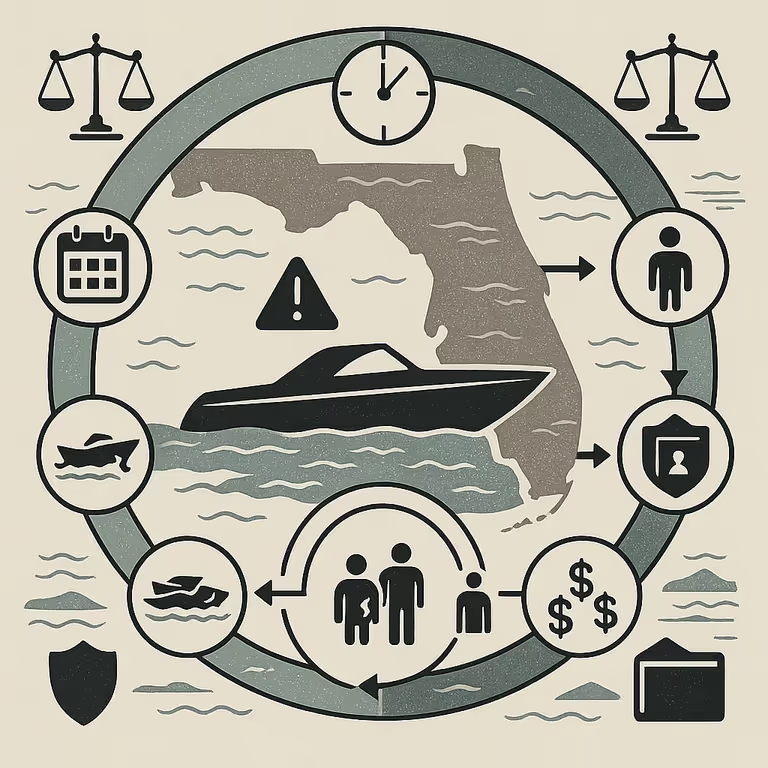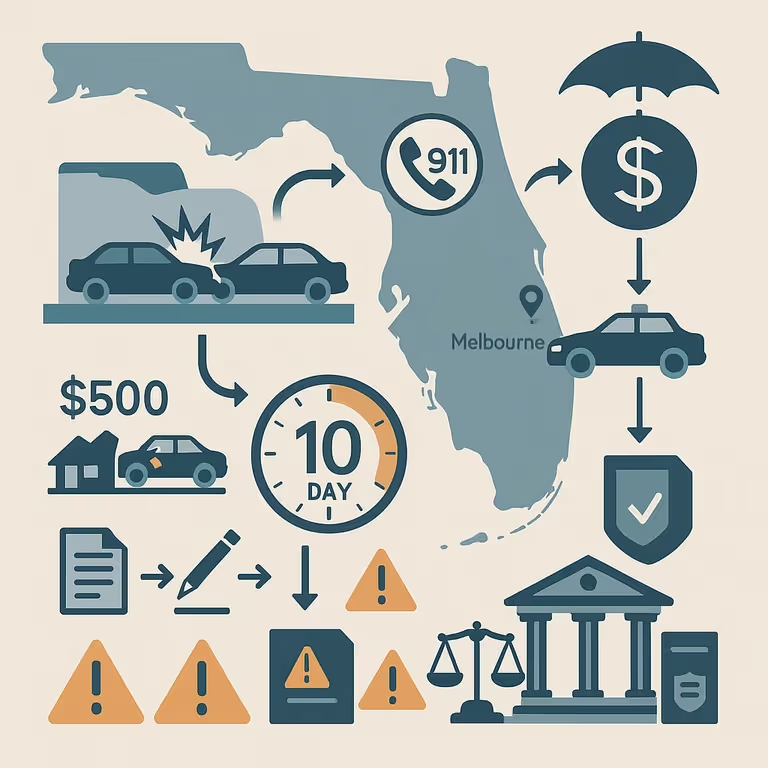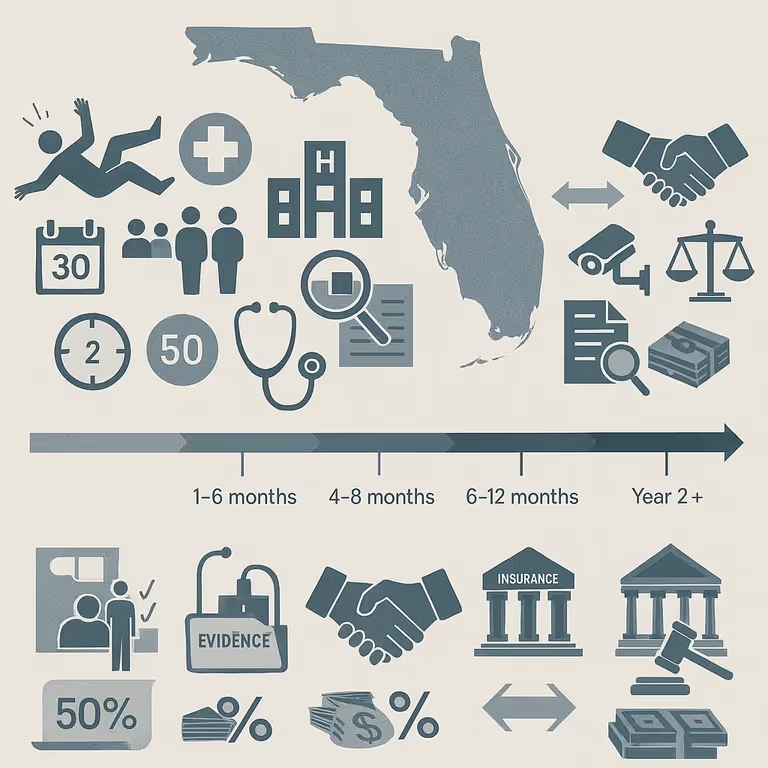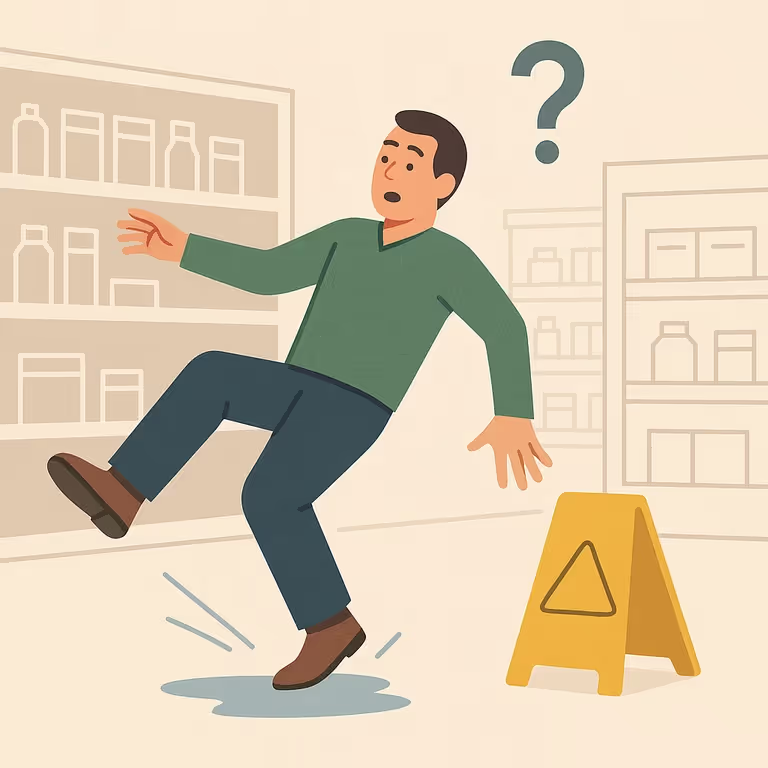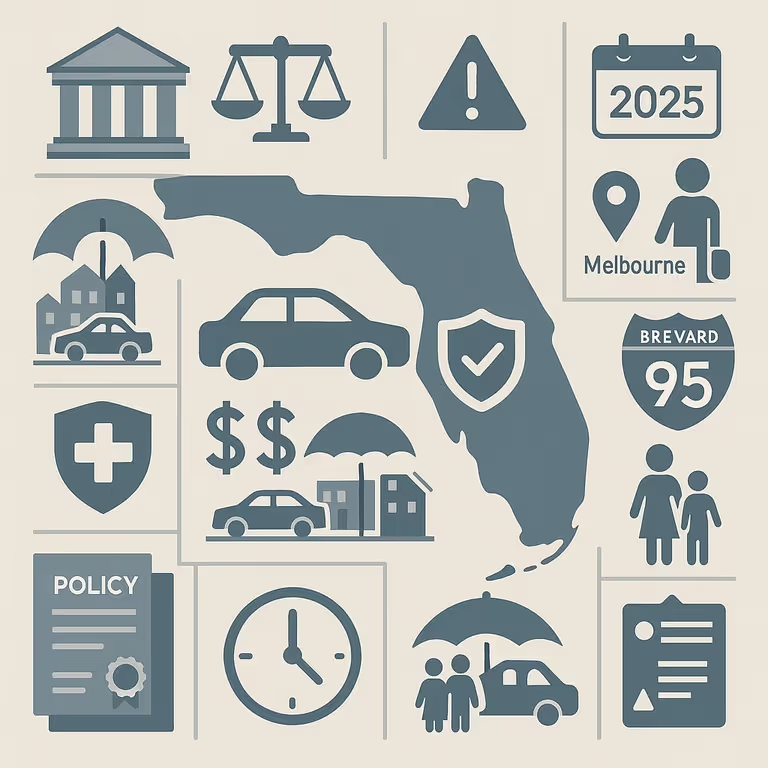Understanding Wrongful Death Lawsuits in Florida: A Complete Guide for Grieving Families
Lost a loved one due to negligence? Learn Florida wrongful death laws, 2023 changes, filing requirements, compensation, and deadlines. Free consultation.

- Florida's 2023 tort reform limits wrongful death recovery if deceased was more than 50% responsible for their death.
- Only the personal representative can file wrongful death lawsuits, representing all eligible survivors and the estate.
- Families have just two years from date of death to file, making immediate legal consultation critical.
Worried About Your Injury Case? We'll Review It - Free!


Understanding Your Legal Rights After a Wrongful Death in Florida
When you lose a loved one suddenly, the grief is overwhelming. When that loss happens because of someone else's carelessness or negligence, the pain is compounded by questions about justice and what rights your family has. You're not alone in feeling lost about what to do next. Many families don't realize they may have legal options available through Florida's wrongful death laws.
The reality is that Brevard County faces significant risks for tragic accidents that can lead to wrongful death situations. In 2023 alone, the Melbourne area recorded 9,216 total accidents, highlighting just how frequently these devastating situations occur in our community. Behind each statistic is a family whose world has been turned upside down.
If your loved one died due to another person's wrongful actions, negligence, or reckless behavior, Florida law may provide a path to seek compensation and accountability. Wrongful death lawsuits aren't about replacing what you've lost—nothing can do that. Instead, they're about ensuring the responsible party is held accountable and that your family receives the financial support needed to move forward during this incredibly difficult time.
Over nearly four decades serving families throughout Brevard County, our firm has helped families navigate these complex legal waters, including a recent $3 million wrongful death judgment that provided much-needed closure and financial security for a grieving family. Understanding your rights and the legal process can feel overwhelming when you're grieving, but you don't have to face this alone.
What Florida Law Considers a "Wrongful Death"
Under Florida law, a wrongful death occurs when someone dies as a result of "the wrongful act, negligence, default, or breach of contract or warranty of any person." In everyday terms, this means that if someone else's careless, reckless, or intentionally harmful actions caused your loved one's death, and your loved one could have sued that person for their injuries if they had survived, then you may have grounds for a wrongful death lawsuit.
To successfully pursue a wrongful death claim in Florida, you must prove four key elements. First, someone owed your loved one a duty of care—for example, a driver has a duty to operate their vehicle safely around pedestrians and other drivers. Second, that person breached or violated that duty through their actions or failure to act. Third, this breach directly caused your loved one's death. Finally, the death resulted in measurable damages to survivors and the estate.
These requirements might sound technical, but they apply to many common situations we see affecting Melbourne area families. Car accident lawyers frequently handle wrongful death cases involving drunk driving, distracted driving, or reckless behavior on local roads like I-95 or US-1. Medical professionals who fail to provide appropriate care, property owners who don't maintain safe premises, and employers who ignore workplace safety requirements can all potentially face wrongful death liability.
Other common scenarios include truck accident cases involving commercial vehicles on our highways, boating accidents on the Indian River or Atlantic Ocean, and premises liability cases involving dangerous conditions at businesses, apartment complexes, or construction sites. Each situation is unique, but Florida law provides a framework for holding responsible parties accountable when their negligence costs someone their life.
The key distinction is that wrongful death claims focus specifically on the losses and damages experienced by the deceased person's survivors and estate, rather than on what the deceased person suffered before death. This is what makes wrongful death lawsuits different from personal injury cases. The focus shifts to how the family and estate have been impacted by the loss.

Recent Legal Changes
If you're considering a wrongful death lawsuit in Florida, it's crucial to understand that the legal landscape changed dramatically in 2023. On March 24, 2023, Governor DeSantis signed House Bill 837, implementing major tort reform that significantly affects how wrongful death cases are evaluated and resolved.
The most significant change involves Florida's adoption of a "modified comparative negligence" system. Under the previous law, families could recover some compensation even if their loved one was primarily responsible for the accident. Now, if your loved one was more than 50% responsible for their own death, your family cannot recover any damages at all. This represents a fundamental shift that can make the difference between receiving compensation and getting nothing.
Consider this example: If your loved one was involved in a car accident where they were speeding but the other driver ran a red light, the old system would have allowed your family to recover damages even if your loved one was found 60% at fault. Under the new law, being more than 50% responsible eliminates any recovery entirely. This makes the investigation and evidence gathering phase of wrongful death cases more critical than ever before.
Doug Beam, who has been representing families in complex wrongful death cases since 1988, emphasizes that these changes affect how we approach every aspect of case preparation. The stakes are now higher for proving that the defendant bears primary responsibility for causing the death. This shift places greater emphasis on thorough accident reconstruction, witness testimony, and expert analysis to establish the correct allocation of fault.
The 2023 reforms also maintain Florida's two-year statute of limitations for wrongful death cases, meaning families have a limited window to file their claims. However, the new comparative negligence standard makes it even more important to begin legal action quickly so that evidence can be preserved and expert witnesses can properly investigate the circumstances of your loved one's death.
Who Can File a Wrongful Death Lawsuit in Florida
Understanding who can legally file a wrongful death lawsuit in Florida is crucial because the law has specific requirements that must be followed exactly. Unlike some other types of legal claims, not just anyone in the family can initiate a wrongful death case. Only the personal representative of the deceased person's estate has the legal authority to file the lawsuit.
The personal representative acts as the legal voice for both the estate and all eligible survivors, even though they're pursuing the case on behalf of everyone who was affected by the loss. If your loved one had a will, they likely named someone as the personal representative (sometimes called an executor). If there was no will, or if the named person cannot serve, the Brevard County probate court will appoint someone to fill this role.
Once appointed, the personal representative must identify and include all eligible beneficiaries in the wrongful death lawsuit. Florida law specifies who can potentially recover damages: the deceased's spouse, children, parents, and any blood relatives or adoptive siblings who were partly or wholly dependent on the deceased for support or services. The law requires that everyone who might be entitled to compensation be named in the lawsuit, even if some family members choose not to participate actively in the case.
This requirement exists to ensure that all potential beneficiaries have their rights protected and that the settlement or judgment can be properly distributed according to Florida's statutory scheme. It also prevents multiple lawsuits from being filed by different family members over the same death, which would create confusion and potentially inconsistent verdicts.
For Melbourne personal injury lawyers familiar with local Brevard County probate procedures, this process typically involves working closely with the family to understand the deceased person's relationships and dependencies. The personal representative will need to provide documentation about family relationships and financial dependencies as part of building the strongest possible case for maximum recovery.

Step-by-Step Process
Navigating a wrongful death case while grieving can feel overwhelming, but understanding the process can help your family make informed decisions during this difficult time. The first 48 hours after a wrongful death are critical for preserving evidence and protecting your family's legal rights.
Immediately after the death, if you suspect someone else's negligence was involved, contact law enforcement and ensure that any accident scene is properly documented. Don't sign any documents from insurance companies or accept any settlement offers without speaking to an attorney first. Insurance adjusters often contact grieving families within hours of an accident, hoping to secure quick settlements for far less than cases are worth.
Evidence preservation is crucial in wrongful death cases. Physical evidence from accident scenes disappears quickly. Skid marks fade, surveillance video gets recorded over, and witnesses' memories become less reliable with time. Our legal team works immediately to send spoliation letters to preserve critical evidence like vehicle data recorders, security footage, and maintenance records that could prove liability.
In Brevard County, the personal representative appointment process typically takes several weeks through our local probate court system. During this time, Riley Beam and our legal team can begin the investigation while the formal appointment is pending. We work with accident reconstruction experts who are familiar with Melbourne area roads and traffic patterns, understanding how local factors like tourist traffic, construction zones, and weather conditions contribute to accidents.
The investigation phase often involves working with medical examiners, reviewing autopsy reports, obtaining employment records to document lost earnings, and interviewing witnesses while their recollections are still fresh. For cases involving medical malpractice or nursing home negligence, we coordinate with medical experts who understand Florida's healthcare standards and can identify departures from accepted care protocols.
Throughout this process, we understand that families need support beyond just legal representation. We coordinate with grief counselors, financial planners, and other professionals who can help families navigate the practical challenges of life after losing a loved one. Our Brevard County wrongful death lawyers have developed relationships with local resources specifically to support families during this difficult journey.
If your family is facing this impossible situation, don't wait to protect your rights. Call us at (321) 723-6591 for a free consultation where we can explain your options and begin investigating your case immediately.
What Compensation Your Family Can Recover
Florida's wrongful death statute provides for both economic and non-economic damages, though understanding exactly what your family can recover requires examining the specific relationships and circumstances involved. The compensation structure is designed to address the financial and emotional losses experienced by different family members.
Economic damages focus on the financial support the deceased would have provided. This includes lost wages, benefits, and services your loved one would have contributed to the family over their expected lifetime. For younger victims, this often represents hundreds of thousands or even millions of dollars in lost future earnings. We work with economists and actuaries who analyze career trajectories, education levels, and industry trends to project these losses accurately.
The calculation also includes the value of services your loved one provided—everything from household maintenance and childcare to financial management and emotional support. Florida courts recognize that these contributions have real economic value, even when they weren't paid services.
Non-economic damages address the intangible losses that matter most to grieving families. Surviving spouses can recover for the loss of companionship, protection, and affection they would have received throughout their lives. Adult children can recover for the loss of guidance, advice, and emotional support from their parent. The pain, suffering, and mental anguish experienced by close family members are also compensable under Florida law.
It's important to understand that different family members recover different types of damages. For example, minor children have different rights than adult children, and the deceased's parents may have claims that differ from those of a surviving spouse. The personal representative must ensure that all eligible family members' interests are properly represented and that any settlement or judgment is distributed according to Florida's statutory framework.
Our firm's experience includes securing significant wrongful death judgments and settlements, including a $3 million wrongful death judgment against a facility that failed to provide appropriate care. Each case is different, but this experience helps us understand how to build comprehensive damages presentations that account for all of your family's losses—both economic and emotional.
Cases involving brain injuries often transition to wrongful death claims when victims don't survive their injuries, and these cases require particular expertise in understanding the full scope of medical costs and long-term care that was lost when the victim died.

Critical Deadlines
Florida's statute of limitations for wrongful death cases is strictly enforced, giving families only two years from the date of death to file a lawsuit. This deadline is absolute. Missing it typically means losing the right to seek compensation forever, regardless of how strong your case might be or how clear the defendant's liability.
While two years might seem like a long time when you're dealing with immediate grief and funeral arrangements, wrongful death cases require extensive investigation and preparation that can take many months. Expert witnesses need time to review medical records, accident reconstruction specialists need to analyze physical evidence, and economists need to calculate lifetime earnings losses. Starting this process early gives your legal team the best opportunity to build a compelling case.
There are limited exceptions to the two-year rule, most notably in medical malpractice cases where the death might not have immediately been attributed to medical negligence. In these situations, Florida's discovery rule may extend the deadline, but families should never assume they have additional time without consulting experienced legal counsel.
The practical reality is that evidence begins degrading immediately after an accident or incident. Surveillance video systems often record over footage within 30-60 days, witness memories fade, and physical evidence disappears. Corporate defendants and insurance companies understand these time pressures and often use delays to their advantage, hoping that evidence becomes unavailable or that families miss legal deadlines entirely.
Beyond evidence preservation, early legal action often leads to better settlement outcomes. When defendants and insurance companies see that a family has retained experienced counsel and is actively pursuing their rights, they're more likely to engage in meaningful settlement negotiations. Waiting until the last minute before the statute of limitations expires often results in rushed case preparation and weaker negotiating positions.
Don't wait to protect your family's rights. Our firm offers free consultations where we can evaluate your case and explain the specific deadlines that apply to your situation.
Common Mistakes That Can Cost Your Family
Many families inadvertently make decisions in the immediate aftermath of a wrongful death that can hurt their potential recovery later. Understanding these common pitfalls can help your family avoid costly mistakes during an already difficult time.
One of the most serious mistakes is giving recorded statements to insurance companies without legal representation. Insurance adjusters are trained professionals whose job is to minimize what their company pays out. They often contact grieving families within hours of an accident, presenting themselves as helpful while asking questions designed to elicit statements that can later be used to deny or reduce claims.
Another critical error is settling too quickly, before the full extent of damages has been determined. In the immediate aftermath of a wrongful death, families are often overwhelmed with funeral expenses and immediate financial pressures. Insurance companies exploit this vulnerability by offering relatively small settlements that might cover immediate expenses but fall far short of compensating for lifetime losses.
Choosing the wrong person to serve as personal representative can also create significant problems. This role requires someone who can work effectively with attorneys, make difficult decisions about legal strategy, and manage what can be a years-long process. Family dynamics and emotional stress can make some individuals unsuitable for this responsibility, even if they are the obvious choice based on family relationships.
Document destruction is another area where families sometimes hurt their own cases. Keeping detailed records of financial relationships, dependencies, and the deceased person's contributions to the family is crucial for proving damages. Bank records, tax returns, insurance policies, and even informal documentation like family calendars showing who handled various responsibilities can all be important evidence.
Finally, waiting too long to seek legal counsel often results in lost opportunities for evidence preservation and case development. Even if families aren't sure whether they want to pursue legal action, consulting with experienced personal injury lawyers who handle wrongful death cases can help preserve options while families work through their grief and make decisions about the future.

Frequently Asked Questions
How much does it cost to hire a wrongful death lawyer?
Our firm works on a contingency fee basis, typically 33% to 40% depending on the case complexity. We advance all case costs, and you pay no attorney fees unless we win your case. This means families can pursue justice without upfront financial burden. Case expenses like expert witnesses and court costs are advanced by our firm, and while these may be recovered from any settlement or judgment, specific arrangements vary by case.
How long do wrongful death cases take?
Cases vary significantly based on complexity, but most resolve within 12-24 months. Simple cases with clear liability and minimal insurance coverage disputes may settle within six months, while complex cases involving multiple parties, disputed facts, or significant damages may take several years to fully resolve. We work efficiently while ensuring maximum recovery for your family, never rushing to settlement if additional time could improve the outcome.
Can we still file if our loved one was partially at fault?
Under Florida's new comparative negligence law (effective March 2023), you can recover damages only if your loved one was 50% or less responsible for their death. If they were more than 50% at fault, no recovery is possible under current law. This represents a significant change from previous Florida law and makes thorough investigation of fault allocation more critical than ever before.
What if the responsible party has no insurance?
We explore all potential sources of compensation, including business insurance policies, homeowner's insurance, and personal assets. Our investigators examine whether multiple parties share responsibility, potentially expanding available insurance coverage. Sometimes parties who seem minimally involved actually carry substantial insurance coverage, and identifying all potentially liable parties is crucial for maximizing recovery.
How is compensation divided among family members?
Florida law specifies how damages are distributed between the estate and individual survivors (spouse, children, parents). The personal representative manages the case, but distribution follows statutory guidelines based on family relationships and dependency. Generally, economic damages are distributed based on the deceased's contributions to each relationship, while non-economic damages like pain and suffering are allocated among close family members according to their relationships with the deceased.
Do we have to go to court?
Most wrongful death cases settle before reaching trial, but being prepared for trial often leads to better settlement offers. Our firm has extensive trial experience, including some of the largest verdicts in Florida history, which gives us credibility in settlement negotiations. Having counsel known for willingness and ability to try cases typically results in higher settlement offers from defendants and insurance companies.
Why Melbourne Families Choose Douglas R. Beam P.A.
When families in Brevard County face the devastating loss of a loved one due to someone else's negligence, they need legal representation they can trust during the most difficult time in their lives. Our firm brings nearly four decades of experience representing families throughout Central Florida, with a track record of more than $1 billion in verdicts and settlements that speaks to our commitment to achieving meaningful results.
Doug Beam has been a respected trial lawyer since 1985, and our firm has served the Brevard County community since 1988. This local experience matters when navigating wrongful death cases because we understand the specific challenges Melbourne area families face, from dealing with local courts and judges to working with medical professionals and expert witnesses who understand our community's needs.
Our track record includes significant wrongful death results, including a $3 million judgment that provided financial security for a family after their loved one died due to facility negligence. We've also achieved landmark verdicts like our $28.5 million brain injury verdict, demonstrating our ability to handle the most complex cases involving catastrophic injuries and death.
What sets our firm apart is our personal approach to every case. We understand that behind every wrongful death lawsuit is a family struggling with grief while trying to navigate complex legal and financial challenges. We provide not just legal representation, but guidance through every aspect of the process, connecting families with counselors, financial planners, and other professionals who can help during this difficult journey.
Our commitment includes advancing all case costs so families never have to worry about paying for expert witnesses, accident reconstruction, or other expenses necessary to build a strong case. We believe access to justice shouldn't depend on a family's ability to pay upfront costs during an already financially stressful time.
You can read about our results and client experiences on our testimonials page, where families share how our representation helped them achieve justice and closure after devastating losses.
If you've lost a loved one due to someone else's negligence, you don't have to face this alone. Call us at (321) 723-6591 for your free consultation, or contact us online. Our Melbourne wrongful death attorneys are here to help your family seek the justice and compensation you deserve.
Sources and Further Reading
- Florida Wrongful Death Statute 768.19 - Right of Action – FL Senate
- Florida Wrongful Death Damages Statute 768.21 – OneCLE Legal Research
- Florida Tort Reform HB 837 Analysis – Alper Law
- Florida Wrongful Death Statute of Limitations Guide – LawsuitLegal
- Florida Wrongful Death Claims Overview – Enjuris
- Melbourne Florida Car Accident Statistics – Florin Roebig
- Brevard County Accident Data Center – AccidentDataCenter
This article provides general information and is not a substitute for legal advice. Laws can change, and the details of your situation matter. For personalized guidance, please contact a qualified Florida personal injury attorney.
Not Sure What To Do Next? We Can Help – Fast & Free.
Worried About Your Injury Case?
We'll Review It - Free
Don’t miss an article
Florida law, local insights, and the occasional dog pic.
Delivered straight to your inbox.
More articles
Browse all articlesFree Case Review
Get a complimentary review of your case

.webp)
.png)
.png)
.png)

